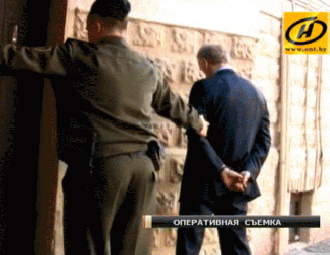Lukashenka denies link between Uralkalij CEO’s release from jail and Putin’s visit

Aliaksandr Lukashenka denied on Saturday that Uralkalij CEO Vladislav Baumgertner had been released from jail because of Russian President Vladimir Putin’s visit to Belarus.
“Putin and I had met a week before that and the president of Belarus had not released anyone. These reports may be aimed at jabbing me or maybe someone else,” he said during his visit to the Dazhynki end-of-harvest festival in Zhlobin, Homyel region.
Mr. Lukashenka said that the Russian executive should be grateful to his mother for his release from jail, reports BelaPAN his words. “She sent me a letter three or four days ago,” he said. “I was told that she had come here, asked for the punishment [sic] to be softened for him. I didn’t make any decision. I simply expressed my opinion that it was investigators who should decide, so that the investigation was not hampered, I was not against the punishment [sic] being changed for him.”
According to the Belarusian leader, investigators working on the case decided that Mr. Baumgertner could be moved to house arrest. “He was released against his mother’s guarantees, the mother is living with him and looking after her son. She is probably a very kind and good person,” he said.
“Let him thank only his mother, not Lukashenka or Putin or Medvedev,” he concluded.
Let us recall that Mr. Baumgertner was arrested on August 26 as he was about to fly out of Minsk after a meeting with Belarusian Prime Minister Mikhail Miasnikovich. A few days later, Belarusian authorities instituted criminal proceedings against Russian billionaire and Uralkalij’s top shareholder Suleiman Kerimov. The case is linked to Uralkalij’s July 30 decision to de facto quit BPC, its joint trading arm with Belarusian potash giant Belaruskalij. Minsk claims that the collapse of the Belarusian-Russian potash sales cartel has caused severe economic damage to Belarus. On September 16, Russian Deputy Prosecutor General Aleksandr Zvyagintsev announced that the Investigative Committee of Belarus would hand over the investigation of the criminal case to the Russian Prosecutor General’s Office. Mr. Lukashenka said on September 19 that Mr. Baumgertner might be extradited to Russia "for investigation."
Russian Prosecutor General Yury Chaika stayed in Minsk on September 24 to discuss the possible return of Mr. Baumgertner to Russia. Mr. Baumgertner was released from the KGB jail on the night between September 25 and 26, hours before Mr. Putin arrived in Belarus to observe a joint military exercise.
-
03.01
-
07.10
-
22.09
-
17.08
-
12.08
-
30.09








































